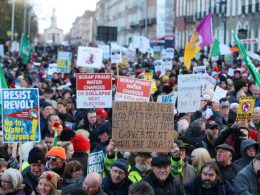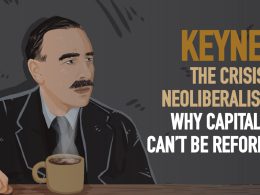Statement of Izquierda Revolucionaria, sister organisation of the Socialist Party in the Spanish state
The court proceedings against Catalan President, Puigdemont and other members of the Catalan government, accused of “rebellion” and “sedition” are the biggest attack on democratic rights in 40 years. This attempt to crush a mass movement in favour of democratic rights, undermines the Spanish capitalist regime (known as the “regime of 1978”) and underlines its authoritarian features and Francoist past.
We do not wish to exaggerate. It is enough to read the content of the charges drawn up by the state prosecutor, Jose Manuel Maza, to get an idea. The charges read that the 1 October referendum and the days leading up to it and after it, were “an insurrection, a violent uprising, in which the section of the population in favour of secession, fired up by its leaders, publically disobeyed and resisted legitimate state authority… The violence seen in the voting centres was the result of the accused who would pursue at any cost the un-constitutional referendum, imposing it by force of the mobilised multitude.”
This state prosecutor, appointed by the PP, says that the millions who peacefully resisted fierce repression in order to exercise their right to vote were involved in a “violent uprising”. And all the politicians – including PSOE – who support this accusation say they are defending democracy!
The accusation also refers to the general strike on 3 October. “The strike was not called in defence of workers rights but as another act of force”. They say that “the events leading up to the proclamation of Catalonia as an independent Republic put in danger fundamental legal rights… which are based on the indivisible unity of the Spanish nation, common fatherland of all Spaniards…”.
The crime of “rebellion”, which legally implies the use of violence, carries a penalty of 30 years in prison. To justify this accusation the state prosecutor now says that this crime does “not require the use of arms, or combat, or grave violence”, and cites as a precedent the case against the leaders of the attempted military coup d’etat against Spanish democracy in 1981!
This shows the nature of the reactionary monarchical block in power in Spain today. They aim not only to inflict a severe defeat on the people of Catalonia which has dared to defy the unjust laws which deny them the right to self-determination. It is also a clear warning to the whole of the working class in the Spanish state of how far the state and Spanish, Catalan or other ruling class, is willing to go to defend their system and interests.
An extraordinary act of democracy
The events of the last months in Catalonia have great lessons. The level of class struggle, triggered in this case by national oppression, which has tested all political forces, has been historic.
It is said that none are so blind as they who refuse to see. The blindness of the Spanish parliamentary Left, is so extreme that there are now only two positions put forward in prominent media: those who support article 155 and hold hands with the right wing wrapped in the Spanish flag and nationalism, and those who speak of the need for “dialogue”, and state that article 155 and the declaration of the Catalan Republic are “two sides of the same coin”. The latter figures compare the actions of a reactionary government in defence of the Spanish and Catalan oligarchy, with a mass movement of people which challenges national oppression in the streets, exposing the reactionary nature of the regime of 1978.
The idea that the results of the 1 October referendum cannot be implemented because it was not “legitimate” is an insult to the will of the people. More than 2.2 million people expressed themselves in the referendum, facing batons and rubber bullets from tens of thousands of military police. What better example of real democracy than a people resisting state violence and the “legality” of crushing their rights.
The turnout in this referendum was higher than in the European elections of 2014! The number of votes in favour of the Catalan Republic was greater than the votes cast in favour of Catalonia’s current ‘statute of autonomy’ (which regulates the relation of Catalonia with the rest of Spain and was approved in a 2006 referendum). What election could be more legitimate than one which had to be fought for against all the repressive machinery of the state?
The capitalists, Catalan, Spanish and European, have understood better than the reformist leaders of the Left the political meaning of the referendum on 1 October and the general strike on 3 October. The example of the Catalan people, showing that mobilisation can defeat repression, has won the solidarity and support of oppressed people around the world, and become a point of reference for millions of workers and youth. Through their direct action on 1 and 3 October the Catalan people, with the youth in the vanguard, opened up a revolutionary crisis. All sectors of the ruling class are united to close this crisis as soon as possible, inflicting a severe defeat on the movement in the process, to serve as a lesson to other peoples in struggle and to all the exploited.
The reactionary monarchical block
Conscious of what is at stake, and of the power of the mass movement for the Catalan Republic, the state apparatus, the monarchy, army and all parties of the regime – with Pedro Sanchez’s PSOE to the fore – have a clear strategy. Maintain historic levels of repression while at the same time, combining it with calling Catalan elections on 21 December. They prefer to base themselves on the terrible political mistakes of the PDeCAT leaders, and try to resolve the situation via defeating them in elections, securing their own social base inside and outside Catalonia. At the same time, they have launched a momentous campaign of fear, and another campaign to sow division among the working class and people of Catalonia.
These campaigns have been underway for weeks. Around 1,700 companies have announced their withdrawal from Catalonia since 3 October, sending a clear message: the Catalan Republic is a threat to jobs, and could lead to thousands of redundancies. We must recognise that this campaign has had some effect, because the leadership of the movement in Catalonia, in the hands of PDeCAT but also of ERC and the CUP, has not answered it in any concrete way. The only way to respond is by making clear that the Catalan Republic will take immediate measures against cuts, in defence of health and education, and against the sabotage of capital through the nationalisation of the banks and big companies to defend jobs and wages and improve the living conditions of the working people.
None of this has been done. On the contrary, since 3 October they have allowed reaction and the Spanish capitalist regime to take the initiative. Moreover, since the application of article 155 the leaders of the Catalan government’s response has been pathetic. They have accepted all the repressive measures since then without proposing any response based on mobilisation. Their cowardice has nothing to do with the heroism of the Catalan working people. They betray the cause of the Republic because they don’t want to break with the capitalist system.
Taking advantage of the weakness of the movement’s leadership, the PP and Spanish ruling class continue to take the initiative. The organisation of marches, like the march on 29 October, in defence of the “unity of Spain”, which more than 300,000 attended, has been accompanied by a media offensive aimed at winning sympathy from workers. They stoke up fear about job losses, and criticise Catalan nationalism as an ideology of the exploiting, racist elite, against the immigrant population of Catalonia. In this dirty work, they have been able to count on the service of a section of the Left, from the social democratic and Stalinist tradition, who have surpassed all precedents of political degeneration.
One case deserves a special mention: the participation in the Spanish nationalist protest on 29 October of Paco Frutos, a former leader of the Communist Party and CCOO union. A feature of his participation in this reactionary spectacle was to attack hysterically the general student strike called by the Sinidat d’Estudiants on 25 and 26 October against Francoist repression. This is no accident. The ruling class uses this discredited figure’s “communist” anti-Franco past to address sections of the Spanish-speaking working class which has a Left tradition, in order to sow the maximum division, confusion and conflict. The role of these leaders, enthusiastic in their support for the PP’s Francoist repression and contributing to spread Spanish nationalist chauvinism, is a crime.
There is only one way to defeat this reactionary offensive: mobilising the masses on the streets like on 1 and 3 October. For this, it is totally necessary to win over the sections of the Catalan working class, who initially remained on the margins of this struggle, many of whom were drawn into the mobilisation on 1 and 3 October against repression and the PP, and who today are looking on events with a mixture of uncertainty and scepticism.
The cause of this is not that working class people are not prepared to struggle against the PP or the system. The reason is that, following the 3 October general strike, instead of maintaining the mobilisation, organising and extending the Committees in Defence of the Referendum (CDR), holding mass assemblies in neighbourhoods and combatting the fear campaign of the ruling class with a working class, socialist policy, the masses were sent home, and the initiative was left in the hands of Puigdemont and co.
The Catalan Republic will only triumph if it is linked to a political programme of action against austerity and cuts, which breaks with the logic of capitalism and the domination of big capital, both Spanish and Catalan. The Republic must be of the people and for the people, the workers and youth. We cannot leave this Republic and its defence in the hands of bourgeois politicians from PDeCAT have resisted executing the will of the people up until the last minute and continue to show their cowardice.
In the face of the offensive of reaction, it is scandalous that the leaders of the movement, especially in PDeCAT and ERC, refuse to put forward a plan of consistent struggle to defend the Republic which has been proclaimed. They fear the mass movement more than the Spanish ruling class, because the movement pushed them further than they wanted to go and the revolutionary process could eliminate them too. For this reason they try to limit the proclamation of the Republic to a symbolic act, and demobilise the masses.
The “equidistant” Left
The fact that the reactionary block is allowed to sow division and stoke up Spanish nationalist prejudices among sections of Spanish workers, is not only down to the role of PSOE or the leaders of CCOO and UGT, who in practice collaborate with the Spanish and Catalan ruling classes. The leaders of organisations with big parliamentary support and which are to the Left of PSOE, like Podemos and Izquierda Unida (United Left – IU), are also adding to the confusion. They defend a position of “equidistance” between the regime of 1978 and the mass movement in Catalonia, and say that the Republic is not “legal” or “legitimate”. Far from helping the cause of the working class and youth in Catalonia or the struggle against national and class oppression, they strengthen the arguments of the Spanish ruling class.
At a moment like this, all organisations are tested. What should the role of Unidos Podemos (parliamentary alliance of Podemos and IU) be? The answer is obvious: lead and organise the mass response on the streets against 155 and a movement in solidarity with the Catalan Republic, linked to a programme against the cuts and corruption to remove the PP from government and defeat the regime of 1978. However, far from this, they continue to insist in arguments which echo the attacks of the Spanish ruling class: that 155 and the Catalan Republic are a result of the lack of “dialogue” and political “responsibility” of both sides.
It is as if these leaders had never heard of class struggle and do not realise that we have reached this point precisely because the Spanish ruling class will never accept a legal referendum in Catalonia. They will not accept it because the Spanish capitalists will not abandon a market like the Catalan one, which represents almost one third of Spanish GDP. They will never allow the Republic to be proclaimed “legally” as this would open the door to a movement – as we are now seeing – which would sooner or later spread to the rest of the state and threaten their regime.
Of all these leaders, Alberto Garzon, leader of IU, is the one who has most virulently opposed the democratic national aspirations of millions of Catalans, pouring scorn on a movement which has faced the PP and the state with a determination which has inspired millions around the world. Garzon has always preached “Republicanism” but now is viciously opposed to the Catalan Republic, because it breaks with the legality of the Spanish ruling class! The worst aspect is that he tries to justify his position with reference to the great Marxist thinkers, when in reality he falsifies Marxism in a grotesque manner, approaching the position of Spanish nationalist chauvinism, assisting the Spanish ruling class in sowing division in the working class movement and feeding Spanish nationalist prejudices.
Garzon claims to be a Marxist but the principle of Marxist dialectics is that the truth is concrete. It was not Puigdeont or PdeCAT which put the regime of 1978 in crisis but the mass revolutionary movement of the Catalan masses. In fact, the different political formations of the Catalan bourgeoisie have been pillars of capitalist stability for decades, supporting the governments of Felipe Gonzalez and Aznar, and defending the interests of the oligarchy.
It is true that the turn of PdeCAT towards a pro-independence position was, at the time, a political manoeuvre to distract attention from their cuts policies and neutralise the mass opposition to them on the streets of Catalonia. It is also clear that the position of the CUP and ERC of providing parliamentary support to PdeCAT to implement its neoliberal agenda in exchange for support for independence, is a complete mistake.
However, it is equally if not more mistaken to refuse to support a mass movement, calling it reactionary, and implore Puigdemont and Rajoy to sit down and negotiate, precisely at a time when PdeCAT is being totally surpassed by the mass movement which has brought about a revolutionary crisis. With who exactly should the movement negotiate? How can we demand an “agreed and legal” referendum from those who respond with police brutality and coup methods against the Catalan people?
Garzon has said repeatedly that “Rajoy and Puigdemont sitting down to talk would solve part of the problem already”. What does this have to do with the position of Marx and Lenin on national oppression and revolution? Nothing, but it has a lot to do with the position of Santiago Carrillo [Communist Party leader] in 1976-78 when the CP – then a mass working class party – called for dialogue and consensus with the Spanish ruling class and inheritors of the dictatorship, in order to abort a revolutionary situation which was escaping their control.
Carrillo and the CP, together with Gonzalez and PSOE were the main architects of the regime of 1978. The CP was the main party of the working class. Today, despite the dignity and commitment to socialism of many of its members, it is not a shadow of what it once was. Does its collapse have nothing to do with its policy during the Transition? The CP leadership then were enthusiastic supporters of the Spanish flag, King, and Francoist amnesty law which left the dictatorship in impunity following its crimes. The CP leadership sacrificed the heroic struggle of its membership in order to “consolidate democracy”, which in reality meant allowing the capitalists to regain control of the situation. The CP leadership opposed the right of self-determination of Catalonia, the Basque Country and Galicia, and as a result became politically insignificant in these territories. Why does Garzon draw no conclusions from this?
More than 100 years ago Lenin wrote a magnificent text – the right of nations to self-determination, establishing the position of revolutionary Marxists. Lenin was not nationalist, nor was Marx or Engels. They were internationalists but understood that the defence of self-determination of oppressed nations, like Catalonia today, was a priority in the fight for socialism. Fighting against national oppression is just as important as fighting class oppression. Of course, in a national liberation movement, Marxists never subordinate ourselves to the capitalist class of the oppressed nation, in this case the Catalan bourgeoisie, or their political representatives (PdeCAT). On the contrary, at the same time as we fight for the right to self-determination – which of course includes the right to independence – we link it to the fight for a revolutionary programme and the socialist transformation of society.
The current crisis in Catalonia, as in other historical epochs, has opened up the possibility of winning a Catalan Republic through revolutionary means, based on the direct action of the people, youth and workers. This is what terrorises the Catalan bourgeoisie which has made an ultimatum to the masses: abandon your revolutionary pretensions or we will unleash economic chaos and plunge you into misery. The same as the Greek bourgeoisie did to the Greek people!
Do these facts not make comrade Garzon reflect? What conclusion should we draw from the alliance between the Catalan and Spanish bourgeoisie to avoid a Catalan Republic? Garzon and other leaders of IU and Podemos call for a “constituent process”, sometimes for a “Federal Republic” in Spain. But they do not clarify the class, capitalist or socialist character of these proposals. Also, how do they plan on initiating this process or this Republic? Via an agreement with the Francoist state and PP? Via a consensus with the Spanish bourgeoisie?
The proclamation of the Spanish Republic on 14 April 1931 was the result of the revolutionary action of the masses, of the city and country, who brought down the dictatorship of Primo de Rivera, and with general strikes and mass mobilisations in 1930 and 1931 forces King Alfonso XIII into exile. The proclamation of the Republic was accepted by the capitalists as a lesser evil, to try to contain the movement of workers, peasants and youth towards a socialist revolution.
This historical analogy is important. A Catalan Republic won through revolutionary action would mean necessarily a fight against the PdeCAT and Puigdemont, against the political and economic elite which has ruled Catalonia with the same neoliberal policies as the PP. The battle against capitalist oppression would be the key to mass action. It could open the door to a government of the Left which would have to immediately end the cuts and confront the dictatorship of big business in Spain and Catalonia, nationalising the banks and big companies.
The Catalan, Spanish, French and European capitalists know it well, which is why they try with all their might to crush the movement. The bourgeois media know it well, which is why they publish their incendiary reactionary articles. Garzon however, continues to repeat that the heroism of the Catalan people in their fight for a Republic, only benefits the forces of reaction.
The tasks of the mass movement
In proclaiming the Catalan Republic in words, the capitalist politicians leading the Catalan government, from the PDeCAT party have gone much further than they wanted to, pushed on by the mass movement. Their faces when they declared the Republic were funeral faces. Since the Catalan capitalists have understood that a revolutionary crisis had been triggered, they have piled pressure on Puigdemont and co to retreat. Since then, they have constantly manoeuvred to retreat and give in to the PP and Spanish state. They are now in total chaos, with speculation that they will seek asylum in Belgium.
The Catalan capitalists and their representatives in PDeCAT are again betraying the cause of Catalonia and the Republic. Instead of calling for mass mobilisation against 155 and repression, and suffering the same situation as hundreds of thousands of working class fighters have, these bourgeois politicians prepare to “heroically” flee, and become symbolic figures in exile. This does not serve the interests of the struggle, only their own image and personal prestige.
The balance of forces in Catalonia is still favourable to defeating the plans of the ruling class and its attempt to end this revolutionary crisis by dividing the working class along national lines. Against the campaign of fear the Left in Catalonia and throughout the Spanish state must call a campaign of mobilisations based on a programme of social and economic demands which answer the urgent needs of millions of workers and youth. This programme should be clear: an end to evictions and cuts, defence of public health and education, nationalisation of the banks and big companies under democratic control to create millions of jobs on decent salaries.
The fighting Left must show to the Catalan working class, especially those who emigrated to Catalonia in the post-war years and whose families have suffered under class oppression, racism and humiliation from the Catalan bourgeoisie, that the Catalan Republic we want is not that of the oligarchy but of the oppressed and working people.
The more time which passes without this programme being adopted, to build a Catalan Republic as a workers’ Republic, the closer the forces of reaction will be to achieving their objectives.
Abstract declarations of the Republic mean little in the face of a concrete counter revolutionary attack. The leaders of the Left must be decisive and base themselves on the immense capacity to struggle shown by the Catalan masses, organise a general strike, impose a Left government to build a workers republic, and remove Puigdemont and PDeCAT from the leadership of the national liberation movement and end their betrayals. This is the task of the CUP, Catalunya en Comu (Left alliance in Catalan parliament) and of Unidos Podemos.
Hundreds of thousands of Catalans view the elections on 21 December as a strategy to liquidate the movement which has led to the Republic. They are correct: the forces of reaction want to give their repression a “democratic” façade with these elections. However, it is now clear that these elections will take place, as PDeCAT and ERC have promised to participate. We must understand that mass mobilisation and defending socialist policies is the best way to defeat the Spanish nationalist right wing and their allies, both now and in the 21 December elections, and ensure that the perspective of the Catalan Republic remains viable.
Turning towards the Catalan working class, in factories and workplaces is key to this process. The working class must be in the front line of struggle against repression and for a Catalan workers’ Republic. However this can only be achieved if the Republic is given social content, showing that a socialist Republic is preferable to a capitalist monarchy which defends the interests of big business, corruption and Franco’s descendants.
The only way to end the confusion, and neutralise the Spanish nationalist campaign, is uniting the workers and youth of Catalonia with their brothers and sisters throughout the Spanish state in mass mobilisation against the PP. Izquierda Revolucionaria clearly states: this is the task which the leadership of Unidos Podemos, especially Pablo Iglesias and Ada Colau, have before them.
The Spanish and Catalan ruling classes look with terror on the proclamation of a Catalan Republic. This is not only because it would ruin their nationalist idea of a great, united Spain. They know that this would be the prelude to an even more intense and deep struggle in the interests of the oppresed, against capitalist domination, against the established social order and for a socialist Republic in Catalonia, and a Federal Socialist Republic throughout the state, based on the free and voluntary unity of peoples and nations. This struggle is already winning the active solidarity of the oppressed masses of Europe and the world.












